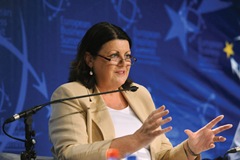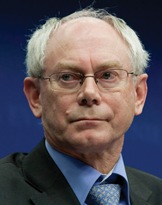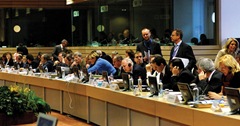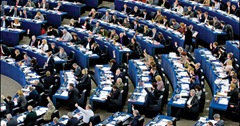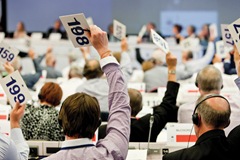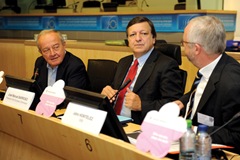Europe’s accountability
An overview of Ireland’s place in the different parts of the EU, how the institutions are appointed, and their links back to the union’s states and people.
President: José Manuel Barroso (Portugal)
Irish Commissioner: Máire Geoghegan-Quinn
(research, innovation and science)
The 27 commissioners are unelected, with each one nominated by a member state government. Once established, the Commission is independent of the governments and tasked with protecting the interests of the EU as whole. Its power rests in its ability to propose legislation, something which neither the Council nor Parliament can do. The other two institutions will then influence the legislation and the Commission ensures that the end result is implemented.
Each Commission is appointed after the European Parliament election, held every five years. Member states firstly agree on a new President, who must then be approved by the Parliament. The President then discusses whom shall fill the other posts with the national governments.
The Council approves the list of commissioners by qualified majority voting and sends that to the Parliament for approval. Each nominee is interviewed and MEPs vote to reject or accept the whole Commission. It is then formally appointed by the Council, again by qualified majority. Commissioners attend European Parliament meetings and can be dismissed by a vote of censure from MEPs. The Lisbon Treaty also requires commissioners to resign if this is requested by the President. They can also be removed by a Court of Justice judgment.
President: Herman van Rompuy (Belgium)
Taoiseach: Brian Cowen TD
The European Council is the top-level grouping of heads of governments. This incorporates 25 prime ministers (known as chancellors in Germany and Austria) and two heads of state with executive powers i.e. the presidents of France and Cyprus. The Commission President is also a member and it has its own President, Herman van Rompuy (pictured). The European Council President is chosen within by its members, using qualified majority voting, for a two-and-a-half year term which is renewable once. Meetings take place around four times per year and set the strategic direction of the EU.
Presidency: Belgium (July-December 2010)
Irish Foreign Minister: Micheál Martin TD
Irish Europe Minister: Dick Roche TD
The Council consists of ministers from all member state governments, which are therefore democratically elected at a national level. It meets almost monthly and its presidency rotates among countries every six months. A country’s share of the 345 votes depends on its population. Ireland has seven, as does Denmark, Lithuania, Slovakia and Finland.
President: Jerzy Buzek MEP (Poland)
Irish MEPs: 12
The only EU institution with its own elections, the Parliament is seen as most democratic part of the EU. Its 736 members have a five-year term. Proportional representation must be used.
Vacancies are generally filled by co-option i.e. an MEP is replaced by a party nominee if he or she stands down. Research by eolas suggests that Malta is the only country which now allows for by- elections; the island state sometimes uses co-options instead.
The Republic of Ireland is one of only three areas where voters choose their own MEP, by single transferable vote. Northern Ireland and Malta are the other two countries using that system. Just 20 MEPs are therefore elected in person.
All others use list systems, where a party draws up its own slate of candidates. These systems assume that people will back a party rather than a person. The first candidate on the list has the best chance of being elected and the last has the least; personal popularity is not tested by voters.
Five countries use regional lists, where the country is sub-divided up into constituencies i.e. the UK (for seats in Great Britain), Belgium, France, Italy and Poland. The remainder have national lists, where the whole country is a constituency. The largest ‘constituency’ is therefore Germany (99 seats), followed by Spain (54 seats). Altogether, the Parliament represents around 500 million people but voter turnout fell to a low of 43 per cent in the 2009 elections. Irish voters took a greater interest, with 58.6 per cent participating.
There are four Fine Gael MEPs, three Fianna Fáil, three Labour, one Socialist (Joe Higgins) and the independent Marian Harkin.
President: Mercedes Bresso (Italy)
Irish members: 18
The committee is an advisory body, comprising 344 local and regional elected representatives across Europe; its term is five years. Ireland has nine full and nine alternate members. Only councillors may join and they must be nominated by the Government on the advice of the Minister for the Environment, Heritage and Local Government. Final formal appointments are made by the Council of the European Union. The same procedure is used to fill vacancies.
Each Irish regional authority area is represented by a full member. The Government also tries to strike a gender balance.
President: Mario Sepi (Italy)
Irish members: 9
Also an advisory body, the Economic and Social Commi
ttee (EESC) again has 344 members, appointed by the Council in the same proportions as for the Committee of the Regions, and also for five years.
There are three groups of members: employers, employees and ‘various interests’ – the latter is a catch-all grouping drawn from professional organisations, scientists, academics and NGOs. This is designed to make the committee reflect European society as a whole, rather than just the two employment groups.
There are three Irish members in each group.
The social partners nominate Irish candidates to the Department of the Taoiseach, whose names are then forwarded by the Government to the Council of the European Union. Vacancies are filled by the relevant social partner, at the Government’s invitation.
The business and employer pillar of social partners nominates the three employers’ representatives. Trade unions nominate three employees’ representatives, including one from Northern Ireland as ICTU is an all-island body. One ‘various interests’ nomination each is made by the community and voluntary pillar, the farming pillar and the environmental pillar.
Neighbours from the North
The UK Government represents Northern Ireland in the European Council and the Council of the European Union; devolved ministers can attend the latter. The Northern Ireland Executive also has an office in Brussels.
Northern voters have a limited say in the UK Government’s formation as the Conservatives are the only national party which contests seats in the province. Its electoral alliance with the Ulster Unionists, known as the ‘Ulster Conservatives and Unionists – New Force’ (UCUNF), ran joint candidates in the 2009 European election and 2010 UK general election.
As a European region, Northern Ireland sends representatives to three European institutions:
• the European Parliament (3 MEPs);
• the Committee of the Regions (4 members);
• the Economic and Social Committee (2 members).
The three current MEPs are Bairbre de Brún (Sinn Féin), Diane Dodds (DUP) and Jim Nicholson (UCUNF).
The Northern Ireland Assembly and Northern Ireland Local Government Association make two nominations each to the Committee of the Regions. Current members are Jonathan Bell (DUP), John Dallat (SDLP), Arnold Hatch (UUP) and Francie Molloy (Sinn Féin).
The two Economic and Social Committee members sit in the ‘various interests’ group: communications consultant Jane Morrice and economist Mike Smyth. Candidates can apply by open competition. Appointments to both committees are approved by the UK Foreign and Commonwealth Office.

